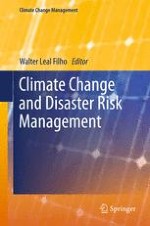2013 | OriginalPaper | Chapter
4. Understanding the Links Between Climate Change and Disaster Management in Pacific Island Countries
Authors : Pritika Bijay, Walter Leal Filho, Veronika Schulte
Published in: Climate Change and Disaster Risk Management
Publisher: Springer Berlin Heidelberg
Activate our intelligent search to find suitable subject content or patents.
Select sections of text to find matching patents with Artificial Intelligence. powered by
Select sections of text to find additional relevant content using AI-assisted search. powered by
